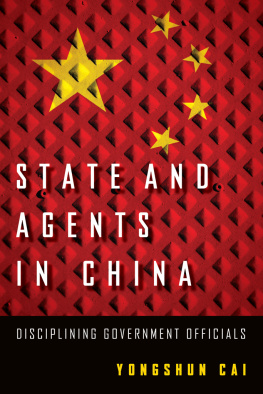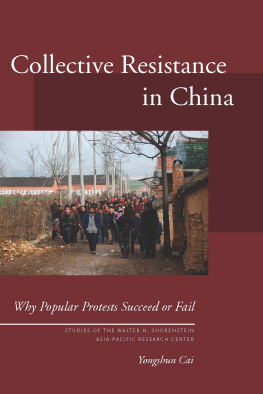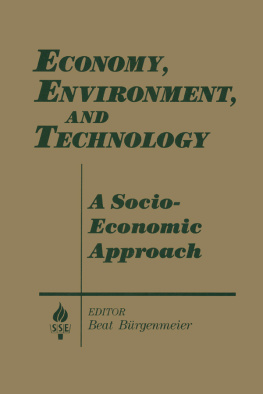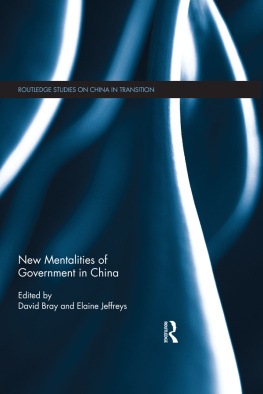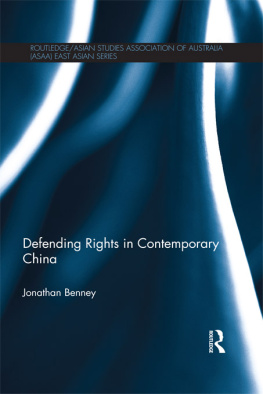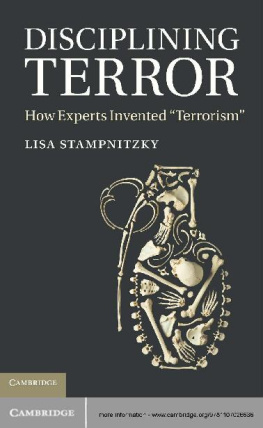Stanford University Press
Stanford, California
2015 by the Board of Trustees of the Leland Stanford Junior University.
All rights reserved.
No part of this book may be reproduced or transmitted in any form or by any means, electronic or mechanical, including photocopying and recording, or in any information storage or retrieval system without the prior written permission of Stanford University Press.
Printed in the United States of America on acid-free, archival-quality paper
Library of Congress Cataloging-in-Publication Data
Cai, Yongshun, author.
State and agents in China : disciplining government officials / Yongshun Cai.
pages cm
Includes bibliographical references and index.
ISBN 978-0-8047-9251-6 (cloth : alk. paper) ISBN 978-0-8047-9351-3 (pbk. : alk. paper)
1. ChinaOfficials and employeesDiscipline. 2. Misconduct in officeChina. I. Title.
JQ1512.Z13D536 2014
352.6'8dc23
2014025802
ISBN 978-0-8047-9352-0 (electronic)
Typeset by Thompson Type in 11/14 Adobe Garamond
State and Agents in China
DISCIPLINING GOVERNMENT OFFICIALS
Yongshun Cai
Stanford University Press
Stanford, California
For My Parents
Figures and Tables
Figures
Tables
Acknowledgments
Many individuals have contributed to this book. Some parts of the manuscript were presented at the City University of Hong Kong, Sun Yat-sen University, Zhejiang University, Xian Jiaotong University, Chengchi University of Taiwan, and Tunghai University of Taiwan. I wish to thank the participants for their comments and suggestions. I owe special debts to the two anonymous reviewers whose constructive and insightful comments on the earlier version of the manuscript proved to be very helpful in the subsequent revision of the manuscript.
I am grateful to Zhu Lin, Huang Liang, Chen Jiayi, Wang Yanrong, Tian Yuan, Lin Chang, Zhao Hui, Chen Shulan, Cheng Chen, Liu Liwen, Chen Sirui, and Li Zhi for their help in data collection. Special thanks are due to those officials in China who were willing to participate in my interviews and who inspired my research over the past few years. I also wish to thank Zhou Titi, Wang Jia, and Wang Yige for their assistance in preparing the final manuscript. Research for this project was partly funded by Hong Kong University of Science and Technology.
At Stanford University, I would like to extend my sincere thanks to Michelle Lipinski and Frances Malcolm for their consistent support for this project.
My wife, Wang Chen, and my daughter, Xinyu, have always been the reliable source of support for my research, and I owe them the greatest gratitude for tolerating my spending much time on the research trips and writing. Over the years, my extended family has helped me in ways more than I can count, and I owe them the greatest debt.
draws on materials published in Disciplining Local Officials in China: The Case of Conflict Management, The China Journal (published by University of Chicago Press) no. 70 (2013), 98119.
ONE
Introduction
In 2011, peasant protests in Wukan village in Guangdong province attracted the attention of the media in and outside China. The protests were provoked by the village cadres, who had sold land without informing or asking permission from the villagers. Although the village cadres were suspected of embezzling a large amount of money obtained through land sales, the other villagers were barely compensated. In September, the villagers began to stage protests in their village and in front of government offices after repeated but unsuccessful petitions. The village representatives negotiated with the town- and county-level authorities but failed to reach a satisfactory solution. In December, the city government of Shanwei solved the dispute by removing the village party secretary and the head while arresting five village representatives for instigating the protests.
The way the city government handled this case is familiar. It disciplined the conflict-provoking cadres to appease the disgruntled villagers while punishing the leaders of the protests or the activists to deter other troublemakers. Most protest incidents end this way, but the Wukan case did not. The county-level authority claimed that all of the major issues raised by the peasants, including the village finances, land issue, and village election, had been resolved, yet the villagers were disappointed because they felt that the governments declaration was untrue. The protests recurred, and the conflict intensified when one of the detained village representatives died in police custody. The government claimed that the representative died of heart disease, a conclusion that the family and other villagers did not accept. Instead, they believed that the representative had died of wounds.
The provincial leaders were dissatisfied with the local officials performance. The head of the investigation team stated that the relationship between some cadres and the people was as incompatible as water and fire. Whether the people were facing difficulties was not these cadres concern. The head of the team criticized the irresponsibility and irresponsiveness of some cadres, blaming them for failing to consider how the peasants who had lost land could make a living. He said:
In some places, the government continues to ignore the problems that have long been raised by the people. If the problem can be suppressed, the government will take immediate and harsh measures to suppress it. The next step is to postpone the settlement as long as possible. In the cadres view, leaving the problems to their successors is preferable. Once they are transferred, whatever happens next will no longer be their business. This mentality is common among local cadres.
Nevertheless, although the criticisms made by the investigation head seemed to be based on what had happened in the Wukan case, the teams attitude toward the local officials involved in the case was not critical. Indeed, the local officials had been irresponsive in addressing this case because between 2009 and 2011, before the large-scale protests began, the Wukan villagers had repeatedly appealed to fourteen government agencies. Despite the lack of response from local officials, the head of the team was positive about the efforts of the county and the city governments, claiming that their earlier efforts created conditions for the ensuing solution to the disputes.
The Wukan case, one of numerous social protests in China in recent years, reveals the issue of local officials accountability in the country. The dispute occurred at the grassroots level between the villagers and the village cadres, but neither the town government nor the county- or city-level authority was able to handle it properly. Eventually, the provincial authority formed a team of high-ranking provincial officials to deal with it directly. This case also reveals the difficulties of using sanctions to ensure accountability. Although high-ranking officials were dissatisfied with the performance of the local officials, the former did not necessarily take punitive measures to deal with the latter.
In China, the performance of local officials is anchored to the fulfillment of their assigned responsibilities. For example, in the case of conflict management, government officials are assessed for their performance in maintaining social stability, and they will be disciplined if they fail. As the Wukan case shows, local officials may be exempted despite their failure in the management of social conflict.
Yet it would be misleading to conclude that Chinese local officials face little risk in failing to perform their duties. As a county Party secretary revealed, Like scared birds, we are on high alert every day, worrying about production safety, sudden events, mass petitions, and other large-scale incidents that will result in punishment.

